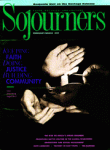It was Sunday night and Sojourners Community was gathered for our weekly worship. Our preacher was Nathan Jernigan, a young African American. His text was from the beatitudes, Matthew 5:6, "Blessed are those who hunger and thirst for righteousness, for they shall be satisfied."
Last fall we did a series on these foundational sayings of Jesus, taking one each week and asking someone who had a particular interest or experience with that beatitude to help us all understand what it might mean for us right now. When I asked Nathan which one he was drawn to, he immediately leapt to Matthew 5:6. The King James Bible says, "Blessed are those who hunger and thirst for what is right, for they shall be filled."
As I listened to this young man preach, I realized that he was making his listeners hungrier and thirstier as he spoke. In the scriptures, "righteousness" is often synonymous with "justice" and the two words are sometimes used interchangeably. Over the years, Sojourners Community has heard many sermons on justice and righteousness. Nevertheless, I could feel the hunger and thirst growing again within me as Nathan went on. Why? I quickly realized it was because he was so passionate, so hungry and thirsty himself.
Nathan Jernigan is the director of the children's program at the Sojourners Neighborhood Center. What this Howard Divinity School graduate student sees every day in our neighborhood and center makes him very hungry and thirsty for justice and righteousness.
Overseeing a children's learning center in a neighborhood where a majority of the young people never finish school makes him hungry for change. When that program consistently turns things around for neighborhood kids and enables every one of them (so far) to progress to the next grade, but then struggles to find the funds to continue, Nathan gets very thirsty for that river of resources that would make righteousness more possible.
When Nathan and other center staff and volunteers try to reach out to young mothers in a neighborhood with a higher infant-mortality rate than Honduras, they get hungry to see healthy babies. When they run a summer program on conflict resolution for 60 children, all of whom have lost brothers, sisters, relatives, or friends to street violence, they become thirsty for an end to the senseless carnage.
Nathan hungrily searches for ways to convince kids to stay off drugs and out of the lucrative and lethal drug traffic--while black youth unemployment is more than 60 percent, the only jobs available are part time and minimum wage, and the ever-present, all-consuming message of their society is that you are what you can buy and material things are the measure of life. When he sees the obvious hunger of hundreds of families who wait in line at the center for food, just blocks from the White House, Nathan feels starved for economic justice and social righteousness. When he sees his young black brothers wasting away in prison or on the streets and his peers becoming an endangered human species, the hunger makes his heart ache.
PERHAPS THAT'S WHY this particular beatitude spoke to Nathan. He is hungry and thirsty and longs to be satisfied. Are we? I don't mean are we for righteousness and justice. We know we're for it. But are we really hungry and thirsty for it?
When we are hungry, we become increasingly concentrated on relieving our hunger. When we are thirsty, we become more and more diligent to quench the thirst. When we are hungry and thirsty, the desire to satisfy our need seems to grow and grow. We are not easily distracted or drawn away by other things. We get single-minded, focused, and persistent. Are we that way about righteousness and justice? Or are we continually pulled away by other cares and concerns?
The movement from social concern to a hunger for justice has both spiritual and political significance. Our "concern" for the poor does little to bridge the enormous distance between us. Indeed, it creates the patronizing dynamic of some people "doing for" others that can become so destructive to everyone. But to become genuinely hungry for justice makes it more possible to join with the poor in a common struggle. It is our own hunger that begins to drive us, not somebody else's problem. Together we long for the day when we shall all find satisfaction. When hungry people learn to share the bread of hope together, a new kind of community becomes possible and the first fruits of justice can begin to be enjoyed.
The day when a substantial number of middle-class American Christians have moved from social concern to a hunger for what is right will be the day when justice becomes more possible in this country. As long as the poor are marginalized in their isolation and the concerned religious people are paralyzed in their guilt, no real change is possible.
It is the hunger and thirst for justice of which the beatitude speaks that could bring us together and transform the political landscape. In the process, we all might find the healing and wholeness that has eluded us, the equality and mutuality that real human cooperation requires, and the dependence on God that could set our hearts free. Maybe that's what Jesus was talking about.
Jim Wallis is editor-in-chief of Sojourners.

Got something to say about what you're reading? We value your feedback!
